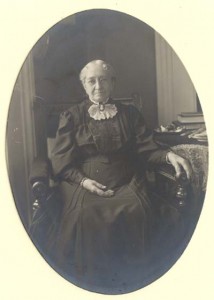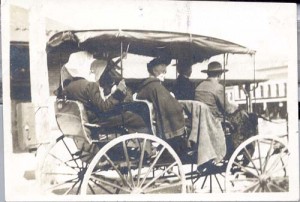 Born January 16, 1818
Born January 16, 1818
Birthplace Probably Long Island, NY
Died 1914
Grave Site Mt. Hope Cemetery, Rochester, NY
Contribution Signer of the Declaration of Sentiments and life-long supporter of the suffrage movement.
Sarah Kirby, one of the eight children of Jacob and Mary R. Seaman Kirby, was born on January 16, 1818. Her parents were Quakers (Society of Friends) who lived on Long Island, New York.
In 1836, at the age of eighteen, she moved to Rochester, New York to live with her sister and brother-in-law, Amy Kirby Post and Isaac Post. They lived at 36 Sophia Street (now North Plymouth Avenue). In 1838, Sarah Kirby married Jeffries Hallowell, and the couple moved to Aurora (Cayuga County), New York. A year later, they moved back to Rochester. In 1844, Mr. Hallowell died.
Like her sister, Amy Post and Post’s niece, Mary Hallowell, Hallowell became active in anti-slavery work in the early 1840s. She joined the newly-formed Western New York Anti-Slavery Society in 1842, and worked on its many Anti-Slavery Fairs — fundraising efforts held over the years to support the anti-slavery movement.
 The Genesee Yearly Meeting of the Society of Friends, to which Hallowell belonged, was against slavery, but its ministers and elders disapproved of the activities of many anti-slavery advocates. Hallowell — again like her sister and her niece — eventually left the Society of Friends (Quakers), although somewhat later, in 1849. (The Posts and Mary Hallowell had left in the mid-1840s.) She was one of the many former Quakers who often gathered at the Anthony home on Sundays to discuss reform activities, including anti-slavery.
The Genesee Yearly Meeting of the Society of Friends, to which Hallowell belonged, was against slavery, but its ministers and elders disapproved of the activities of many anti-slavery advocates. Hallowell — again like her sister and her niece — eventually left the Society of Friends (Quakers), although somewhat later, in 1849. (The Posts and Mary Hallowell had left in the mid-1840s.) She was one of the many former Quakers who often gathered at the Anthony home on Sundays to discuss reform activities, including anti-slavery.
Hallowell became involved in the Spiritualist movement in the late 1840s. She was an early supporter of Kate and Margaret Fox (the ” Fox Sisters”). The Fox Sisters postulated that certain “rappings” which they had heard at their house in Hydesville, New York were messages from the dead. They acted as mediums to “decipher” the messages, and attracted widespread attention and many followers.
Hallowell was also an active supporter of the Mechanics Institute (later the Rochester Institute of Technology). However, she is best known for her efforts on behalf of women’s rights. She was both an activist in the nineteenth century women’s movement and a financial supporter of the cause.
Hallowell attended the first Women’s Rights Convention held in Seneca Falls, New York, in July 1848 and was a signatory to the Declaration of Sentiments. When an adjourned meeting of the Convention was called in Rochester a few weeks later, on August 2, 1848, Hallowell was elected as one of its secretaries, along with Elizabeth McClintock and Catherine A.F. Stebbins. Unfortunately, none of them could speak loud enough to be heard in the hall, and Sarah Anthony Burtis, a former schoolteacher, had to step up and assume the role of acting secretary.
Hallowell maintained her women’s rights activities after her second marriage, to Edmund P. Willis, in 1853. In the late 1860s, she joined the National Woman’s Suffrage Association (NWSA), formed by Susan B. Anthony and Elizabeth Cady Stanton. In 1872, when Susan B. Anthony voted in the presidential election, Hallowell Willis also attempted to register to vote, but was unsuccessful in her efforts. The following year, when the Women’s Taxpayers Association (WTA) was organized, Hallowell Willis was one of its officers.
In 1878, when NWSA held its meeting in Rochester to celebrate the thirtieth anniversary of the first Women’s Rights Convention, Hallowell Willis was one of the delegates representing Monroe County. And, in 1885, Hallowell Willis became one of the initial members of the Women’s Political Club of Rochester (later renamed the Political Equality Club). During the 1905 meeting of the New York State Women’s Suffrage Association, held in Rochester, Hallowell Willis was introduced by Susan B. Anthony as one of those who had attended the 1848 Convention. And in 1907, as one of the “old and beloved suffrage workers,” she received a telegram of appreciation from the National American Woman Suffrage Association (NAWSA) Convention.
Hallowell Willis was also known as a dependable friend when financial help was needed by the women’s movement. Ida Husted Harper, biographer of Susan B. Anthony, wrote that “for nearly fifty years,” whenever “financial difficulties threatened,” Anthony “had never appealed in vain” to her. For Anthony’s seventieth birthday in 1890, Hallowell Willis gave a gift of two hundred dollars. She gave $720 to the Second New York Campaign of 1893-94, a campaign during which New York activists worked day and night to get women’s suffrage enacted into law. When, on September 5, 1900, Anthony found herself $8,000 short of funds in the campaign to open the University of Rochester to women, Hallowell Willis readily donated $2,000 to the cause. When a Memorial Association was formed shortly after Susan B. Anthony’s death in 1906, in order to collect funds to erect a building in her name on the University of Rochester campus, she gave the largest single gift — $5,250. And in 1910, when funds were needed by the workers in the State of Washington in their attempts to enact a suffrage amendment, she again came through with a donation.
In addition to being a women’s rights activist and supporter, Hallowell Willis was also a close personal friend of Susan B. Anthony. She was one of only twelve friends who celebrated New Year’s Day with the Anthonys in 1895. On the occasion of Anthony’s eighty-first birthday in 1901, when public celebration of the event was “forbidden,” Hallowell Willis was one of the few women invited to dinner at the Anthony house. And, Hallowell Willis was one of twelve women invited to a celebration of the one-hundred-and-eleventh birthday of Anthony’s mother, on December 2, 1904.
Hallowell Willis did not live to see the triumph of the cause of women’s suffrage. She died in 1914, at the age of ninety-six.
Bibliography of Suggested Books & Articles
- Harper, Ida Husted, The Life and Work of Susan B. Anthony, vols. II & III., Indianapolis and Kansas City, The Bowen-Merrill company, 1898-1908.
- Hewitt, Nancy A., Women’s Activism and Social Change, Rochester, New York, 1822-1872, Ithaca: Cornell University Press, 1984.
- History of Woman Suffrage, vols. I, II, III, IV, V, VI, reprint published by Source Book Press, 1970.
- McKelvey, Blake, “Susan B. Anthony,” Rochester History, v. VII, no. 2 (April 1945).
- McKelvey, Blake, “Woman’s Rights in Rochester: A Century of Progress,” Rochester History, v. X, nos. 2 & 3 (July 1948).
Bibliography of Suggested Web Sites